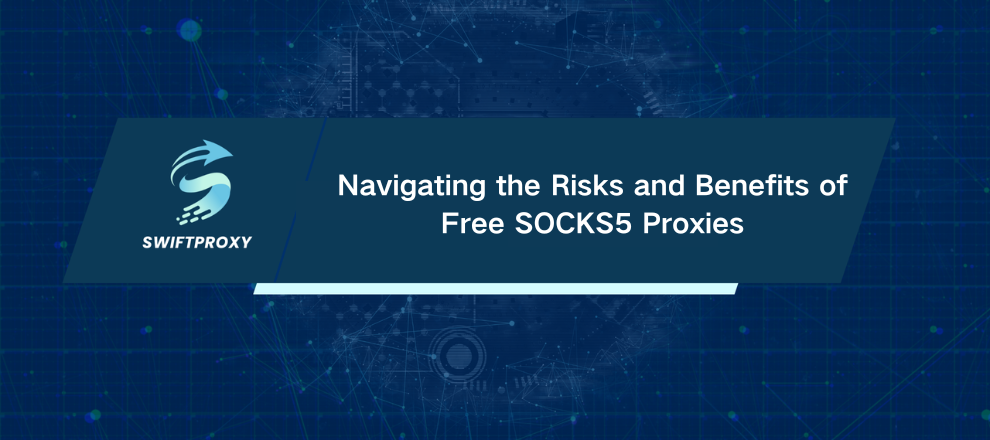Navigating the Risks and Benefits of Free SOCKS5 Proxies

Free SOCKS5 proxies sound great on paper. They're free. They hide your IP. They give beginners a way to test web scraping, market research, or bypass geo-restrictions without spending a dime. However, speed is sluggish. Stability is questionable. Security? Often weak.
Countless users experience dropped connections, slow data transfers, and gaps in encryption when using free proxies. For online activities involving sensitive data, relying solely on a free proxy is a significant gamble. The real question isn't whether they function—but how much frustration and risk can be tolerated.
Understanding SOCKS5 Proxies and Online Privacy
SOCKS5 proxies route your internet traffic through an external server, masking your real IP while supporting multiple protocols and data types. They're versatile tools. Market researchers, web scrapers, and privacy-conscious users rely on them.
But SOCKS5 is not magic. It enhances privacy, yes—but the level of protection depends on the provider. Free options often fall short, especially when you demand consistency and speed.
Key Features:
Relay traffic and hide your IP.
Support multiple protocols.
Bypass geo-restrictions.
Widely used in web scraping and research.
Free SOCKS5 Proxies Explained
Free SOCKS5 proxies are basic tools. Providers often offer them as a teaser, hoping users will eventually pay for upgrades. They handle traffic and mask your location—but only to a point.
Limited servers and shared resources mean slow speeds. No guarantees on uptime. Light browsing might be fine—but heavy research, streaming, or intensive scraping? Forget it. Free proxies are fine for testing—but not for serious work.
Primary Takeaways:
Hide IPs at zero cost.
Limited speed and reliability.
Suitable for casual browsing.
Not recommended for heavy tasks.
The Limitations of Free SOCKS5 Proxies
Free proxies are slow. Servers are shared among countless users. Delays happen. Connections drop. Data can leak. Encryption is weak. Outdated technology exposes you to risks that cost more than just time—they can compromise your entire workflow.
Essential Elements:
Slow, congested servers.
Low stability and weak encryption.
Frequent disconnections and security vulnerabilities.
Premium proxies deliver better speed, stability, and protection.
Issues with Performance and Security
Shared servers, heavy traffic, high latency. Free proxies can't handle intensive requests. Troubleshooting connection errors eats into productivity. Market research suffers. Data scraping slows down.
Security isn't much better. Without strong encryption, sensitive data is exposed. Free proxies can be a playground for cyber threats. If your work involves sensitive or business-critical data, these risks are unacceptable.
Core Features:
Slow speeds and high latency.
Frequent connection timeouts.
Weak encryption.
Elevated risk of data exposure.
Unseen Costs and Operational Risks
Free proxies aren't truly free. The cost is hidden: lost productivity, missed deadlines, troubleshooting hours. Customer support? Nonexistent. Operational risks—IP bans, data breaches, or account suspensions—can cripple businesses.
Main Advantages of Knowing This:
Free proxies cost time and efficiency.
They can disrupt operations.
Data breaches and IP bans are real threats.
When to Upgrade to Premium SOCKS5 Proxies
Are your free proxies slowing you down? Dropping connections constantly? Exposing sensitive data? If yes, it's time to upgrade. Premium proxies offer fast, stable servers, higher uptime, and strong encryption. Troubleshooting becomes simpler. Productivity improves.
Primary Takeaways:
Upgrade when speed or security falls short.
Premium proxies provide faster, more reliable connections.
Dedicated servers reduce downtime.
Work flows uninterrupted.
Business and Personal Applications
Premium proxies aren't just for businesses. Market research firms scrape vast datasets without hitting IP bans. Retailers manage geo-restricted content seamlessly. Individual users secure transactions, browse privately, and avoid annoying blocks. Premium SOCKS5 proxies serve both professional and personal needs efficiently.
Core Features:
Support intensive business research.
Ensure accurate and stable data collection.
Protect personal and professional online activities.
Compatible with HTTP and SOCKS5 protocols.
Free vs. Premium Proxy
Free SOCKS5: Free SOCKS5 proxies come at no cost, but this comes with trade-offs. They are generally slow, offer low stability, and use weak encryption. Server options are limited, and there is no dedicated support, making them suitable only for casual or low-risk use.
Premium SOCKS5: Premium SOCKS5 proxies, on the other hand, are paid services that deliver fast, stable, and secure connections. They feature strong encryption, extensive server options, and dedicated customer support, making them ideal for users who prioritize efficiency, reliability, and peace of mind.
Real-World Case Studies
A market research firm switched to premium proxies and accelerated data collection while reducing connection errors. An online retailer avoided IP bans and ensured secure transactions. Users consistently report faster speeds, fewer technical problems, and responsive customer service. The takeaway? Premium SOCKS5 proxies deliver tangible results.
Key Features:
Improved speed and stability.
Reduced connection errors and IP bans.
Positive user feedback supports the upgrade.
Best Practices for Enhancing Proxy Performance
Use rotating datacenter proxies for high uptime.
Test connection speed and stability regularly.
Employ proxy management tools to track performance.
Adjust strategies based on data insights.
Ensure proxies support both HTTP and SOCKS5 protocols.
Following these steps maximizes speed, security, and reliability.
Conclusion
Free SOCKS5 proxies are tempting—but they can't keep up with serious demands. Hidden costs, performance gaps, and security risks make premium proxies the smarter choice. Faster connections, better encryption, and responsive support enhance productivity and protect sensitive data.
Evaluate your needs. Consider workload, security, and the importance of reliable performance. Upgrading isn't just a luxury—it's an investment in efficiency, safety, and peace of mind.

















































